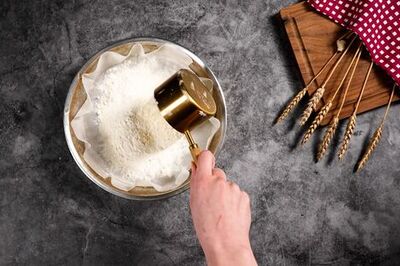
views
Offer your dog a chew toy.

Redirect your dog’s chewing to something positive, like a toy. Your dog might be nipping to self-soothe or because they’re overwhelmed. In that case, a soft chew toy is a great stand-in for your hand. When your dog nips at you, calmly move away, then offer them a chew toy instead. Over time, they’ll understand that instead of biting you, they should bite their toys. Training your dog takes time, and you may have to offer them a chew toy over and over again before they make the connection in their head.
Give your dog a command.

Make your dog focus on a command so they stop biting. If your dog nips you or anyone else, tell them to “sit,” “stay,” or “leave it.” When they follow your directions, reward them for good behavior by offering them a treat or a toy. Dogs will often bite in excitement because they’re overstimulated. If you can get their mind to focus on something else, they may calm down enough to stop nipping. If your dog is a puppy, work on teaching them basic commands so they can follow your directions.
Say “Ouch!” when your dog bites.

Let your dog know that they’re hurting you so they back off. Your dog might not realize that their bites actually hurt you, since many dogs bite as a form of play. When your dog bites, let your hand go completely limp, then say “Ouch!” loudly but firmly. Try not to jerk your hand away or squeal loudly, since your dog might see those as a sign that you’re playing. Instead, keep your voice calm and your movements slow.
Offer your dog a treat for good behavior.

Positive reinforcement, like treats, tells your dog what they should be doing. If you notice that your dog isn’t biting, or if they follow your commands to stop biting, give them a treat as a reward. Not only will it strengthen your bond, but it will teach your dog that not biting is a good thing. In general, using positive reinforcement with dogs is more effective than negative reinforcement, because it tells your dog what they should be doing rather than scaring them into submission.
Put your dog in a crate or time-out area.

Use “detention” as a way to calm your dog down. When your dog bites because they’re excited, calmly but firmly lead them to their crate or another room. They don’t have to stay in for long—let them out when they’re no longer super excited or overstimulated. You can tell your dog is calm when they lie down on their own without a command. You can also tell they’ve calmed down once they aren’t barking or jumping when you enter the room. With enough repetition, your dog will understand that biting means they have to leave the room, and they’ll avoid the behavior.
Ignore your dog when they bite or nip.

Don’t give your dog any attention, since that could encourage them. Turn away from your dog and let them calm down on their own. Once a few minutes have passed, turn back toward them and try petting them or offering them a chew toy. This is a great tactic to try if you think your dog is biting to get your attention.
Wear gloves with a taste deterrent.

Make your hands taste bad so your dog tries not to bite them. If you’ve tried a few other methods and they aren’t working, buy some cotton gloves and coat them with a taste deterrent that makes them smell and taste bad. When your dog nips your hands, they’ll be disgusted by the taste, and they hopefully won’t try to bite you again. You’ll have to wear your cotton gloves multiple times for your dog to make the connection in their head. Keep in mind that if your dog is smart or good at recognizing patterns, this tactic may not work. Your dog might make the connection that gloved hands taste bad, but ungloved ones don’t.
Keep your dog on a leash.

Hold your dog close to you so that they can’t bite other people. If your dog likes to nip strangers or guests in your home, the best way to deter them is to keep them from biting at all. When your dog sees someone and gets excited, keep them on a leash and hold them close to you. Then, let your friend or a stranger pet them once they’ve calmed down. If your dog likes to bite or nip you on walks, try a Gentle Leader. This harness goes over your dog’s snout so you can direct their mouth where you want it to go.
Avoid physical punishments.

Scare tactics and punishments only make your dog feel afraid. Don’t use tactics like spray bottles, holding your dog by the muzzle, pinning them down, or making loud noises at them. Your dog will only learn that they should be afraid of you, and they won’t make the connection that biting is bad.
Exercise your dog daily.

Let them burn off their energy so they’re less likely to bite. When your dog is tired, they’re much less likely to expend energy by biting or nipping you. Make sure you take your dog on walks every day, and give them plenty of toys and treats to stimulate their minds, too. Your specific dog breed may need more exercise than others. In general, high-energy large dogs need more exercise, while low-energy small dogs need less. Food puzzles are a great way to mentally stimulate your dog during meal times.
Let your dog rest when they’re tired.

Give your dog a chance to rest so they don’t bite out of overstimulation. Dogs will sometimes give a warning bite when they need space. If your dog is tired or overwhelmed, they may be biting because they want people to stay away from them. Be sure your dog has a safe, comfortable place to lie down, like a bed or a crate. Give them a chance to rest and recover after exercise so they feel happy and ready to play again.




















Comments
0 comment